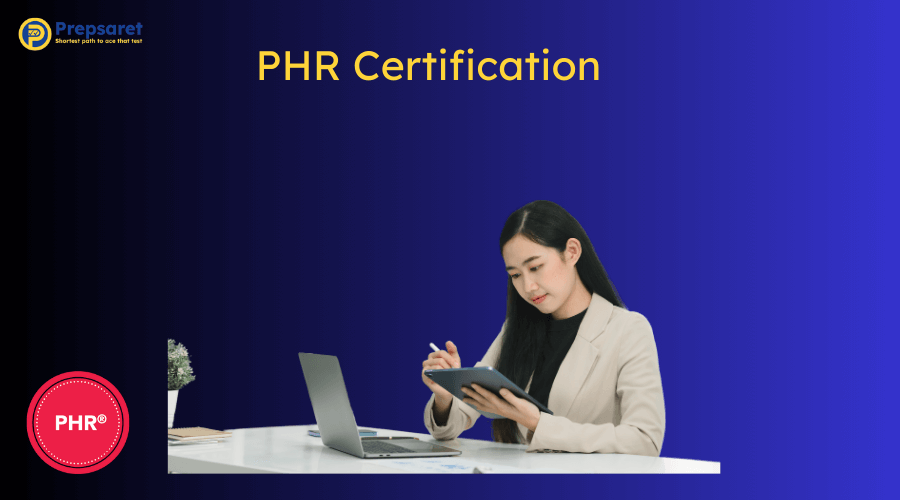PHR Certification
If you’re an HR professional looking to stand out in the field, earning your PHR (Professional in Human Resources) certification could be a game-changer. The Professional in Human Resources certification is a respected credential that demonstrates your expertise and dedication to the HR profession. It shows employers that you have a strong foundation in HR practices, making you more competitive in the job market.
Not only does it boost your professional credibility, but it also opens up new career opportunities. Whether you’re aiming for a promotion, a higher salary, or just want to prove your skills, the PHR certification is an excellent way to achieve these goals.
With options like PHR certification online and flexible PHR certification programs such as the one offered by Prepsaret, it’s easier than ever to begin your certification journey. The process involves meeting PHR certification requirements, passing an exam, and continuing education—but the rewards are well worth the effort.
If you’re wondering, “What is PHR certification?”, it’s a globally recognized HR credential that can significantly impact your career. Ready to take the next step in your HR career? Let’s dive into how you can earn the PHR certification.
Eligibility Criteria for the PHR Certification
Before you can earn your PHR certification, you’ll need to meet certain qualifications. Here’s what you need:
- Education Requirements: If you have a high school diploma or associate’s degree, you’ll need at least four years of HR experience. If you hold a bachelor’s degree, you only need two years of experience.
- Work Experience: You’ll need hands-on HR experience in areas like recruitment, employee relations, compensation, and benefits.
- Professional Affiliations: While it’s not required, being a member of professional organizations, such as SHRM (Society for Human Resource Management), can be beneficial when preparing for the exam.
Meeting these PHR certification requirements ensures you’re well-prepared for the certification process.
Benefits of Earning a PHR Certification
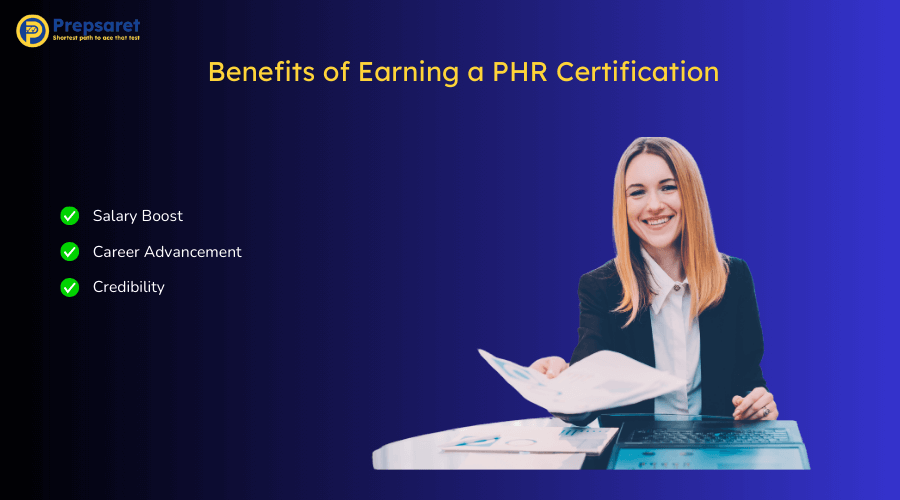
Earning your PHR certification isn’t just about passing an exam—it’s about growing in your HR career and building professional credibility. Here’s why it’s worth it:
- Credibility: With the PHR certification, you’ll show employers you have the knowledge and skills necessary to succeed in HR.
- Career Advancement: The certification helps set you apart from the competition, giving you access to more senior-level roles.
- Professional Commitment: It demonstrates your dedication to staying updated with HR trends and best practices.
- PHR Certification Salary Boost: Certified HR professionals often earn significantly more, making it a great investment in your career.
In short, the PHR certification isn’t just a piece of paper—it’s a stamp of excellence in your HR career.
Career Growth and Salary Potential with a PHR Certification
The benefits of the PHR certification go beyond just the knowledge—it can have a major impact on your career growth and earning potential. Here’s how:
- Promotions: Many employers prioritize certified HR professionals when considering candidates for promotion. The certification shows you’re committed to your career and ready for more responsibility.
- Higher Salary: Studies show that HR professionals with the PHR certification often earn more than their uncertified peers. It’s a great way to boost your earning potential in a competitive field.
- Job Security: As organizations recognize the value of certified HR professionals, having the PHR certification can provide job security. Employers want individuals who can contribute to the success of the company, and certified professionals are more likely to stand out.
If you’re considering the costs, note that PHR certification cost varies depending on the program and exam fees, but it’s a worthwhile investment in your future.
Additionally, you may find PHR certification online free resources to help you prepare effectively. Earning a PHR certification can truly transform your career, both in terms of opportunities and financial rewards.
PHR Certification Requirements: What You Need to Know
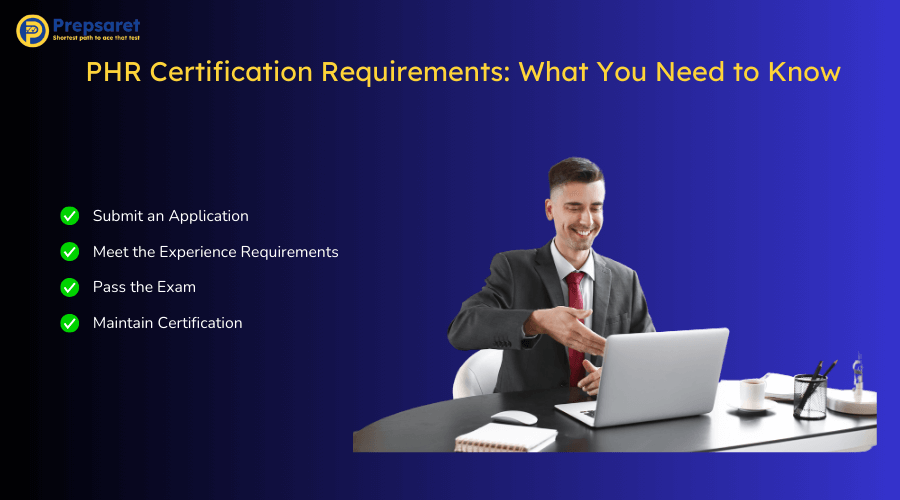
To ensure you’re eligible for the PHR certification exam, you’ll need to follow these steps:
- Submit an Application: Fill out the application form, providing details about your education and work experience.
- Meet the Experience Requirements: Make sure you meet the necessary work experience qualifications.
- Pass the Exam: The PHR certification exam is a multiple-choice test that covers essential HR topics.
- Maintain Certification: Once you earn your PHR, you’ll need to complete continuing education to maintain your certification.
For those looking to expand their credentials further, pursuing an SPHR certification (Senior Professional in Human Resources) is another option for advancing in your HR career. It’s a straightforward process, but make sure to review all the requirements before getting started.
Key Topics Covered in the PHR Certification Exam
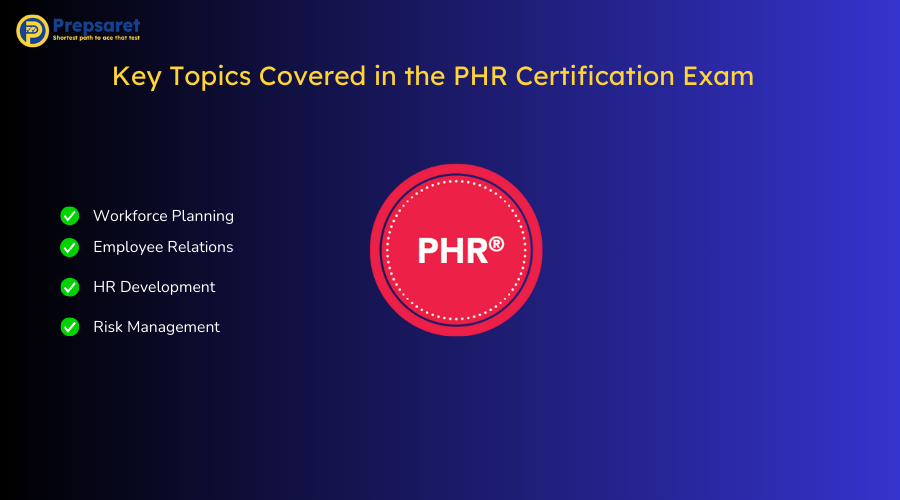
The PHR certification exam covers a wide range of HR topics, including:
- Workforce Planning: Learn how to effectively manage a company’s workforce, including recruitment and retention strategies.
- Employee Relations: Understand how to address conflicts, mediate disputes, and foster a positive work environment.
- HR Development: Focus on training and development strategies that enhance employee performance.
- Compensation: Gain insight into pay structures, benefits, and incentive programs.
- Risk Management: Learn about compliance with labor laws, workplace safety, and managing HR-related risks.
Each of these topics is critical for success in the HR field, making the PHR certification a comprehensive test of your HR knowledge. Whether you’re exploring PHR certification programs or searching for PHR certification free resources, preparing thoroughly will help you succeed.
With flexible options like PHR certification online, you can study at your convenience and begin your journey to becoming a certified HR professional today.
How to Prepare for the PHR Certification Exam
Preparing for the PHR (Professional in Human Resources) certification exam might feel like a daunting task, but don’t worry—it’s absolutely doable with the right approach. Whether you’re aiming to boost your HR career or take on new challenges, the PHR certification can open up a world of opportunities.
We’ll walk through effective study techniques, useful resources, and expert tips to ensure you’re ready to tackle the exam with confidence. Let’s dive in!
Top Study Resources for PHR Certification Success
When preparing for the PHR exam, the right resources can make all the difference. Here’s a roundup of the best tools to help you succeed:
Online Courses Online courses are a great way to get structured lessons. Many platforms offer PHR certification online prep courses, which can help break down complex HR concepts into bite-sized, easy-to-understand lessons.
Some top choices include:
- SHRM Learning System
- HRCP (Human Resource Certification Prep) Study Program
- Prepsaret PHR Prep Courses
Study Guides A well-organized PHR certification study guide can help you focus on the most important topics and keep your study sessions efficient. Make sure to get one that’s up-to-date with the latest exam content outline. Some popular study guides include:
- PHR Study Guide by Prepsaret
- HRCP Study Guide
- SHRM PHR Study Guide
Practice Exams Taking practice exams is one of the best ways to familiarize yourself with the exam format and timing. It also helps build your confidence and highlight areas where you may need more study. Check out:
- PHR Practice Exams from HRCP
- Free Online Practice Tests (There are many available for free to help you test your readiness!)
- PHR Study Groups: Joining a study group can provide both motivation and valuable insights. You’ll be able to discuss difficult topics, share tips, and stay on track. Look for local or online study groups on platforms like LinkedIn or Reddit.
Understanding the PHR Certification Exam Structure Before you start your studying, it’s essential to understand the structure of the PHR certification exam.
Knowing what to expect will help you approach your study plan with confidence and reduce exam-day nerves.
Exam Format and Time Allotment Overview
The PHR exam consists of 150 multiple-choice questions designed to test your knowledge in key HR areas. The questions will cover topics like employee relations, recruitment, compensation, and employment law. You’ll have 3 hours to complete the exam, so managing your time is crucial.
- Number of Questions: 150
- Question Types: Multiple-choice
- Time Allotment: 3 hours
The exam will assess your understanding of real-world HR scenarios, so it’s important to focus on applying your knowledge, not just memorizing facts.
Tips for Passing the PHR Certification on Your First Attempt
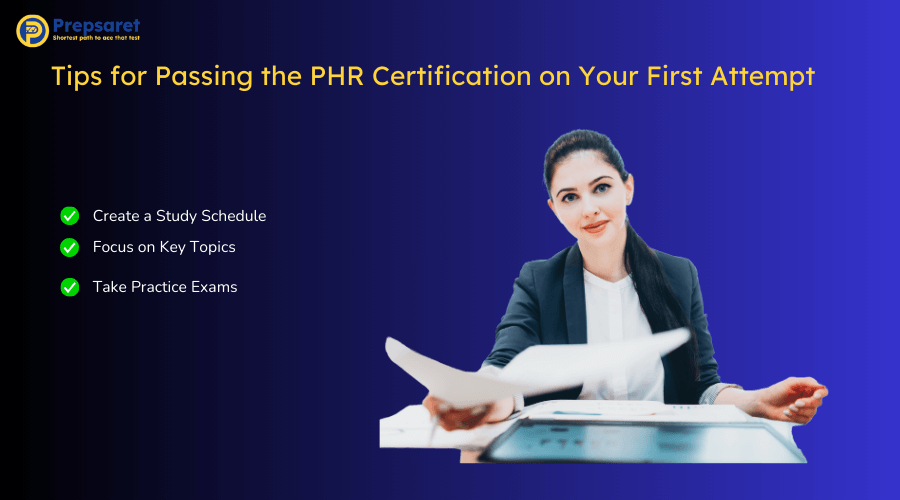
Success on the PHR exam isn’t just about studying hard—it’s about studying smart! Here are some practical tips to help you pass the PHR certification exam on your first attempt.
Create a Study Schedule
A study schedule helps you stay organized and focused. Break down your study material into manageable chunks and allocate time for review. Remember to include breaks to avoid burnout!
Focus on Key Topics
While it’s important to study everything, some areas of the exam carry more weight than others. Focus on critical HR topics like:
- Workforce Planning and Employment
- Employee and Labor Relations
- Compensation and Benefits
- Risk Management
- Learning and Development
Take Practice Exams
As mentioned earlier, practice exams are a game-changer. They’ll help you get comfortable with the exam format and timing, and identify areas for improvement. Take at least a couple of full-length practice exams before the real test.
Stay Calm and Confident
On the day of the exam, remember that you’ve prepared well. Stay calm, read each question carefully, and avoid rushing. You’ve got this! Check this out: Try PHR Free Questions
Common Mistakes to Avoid During PHR Exam Preparation
While preparing for the PHR exam, there are a few common mistakes to watch out for. Avoid these pitfalls to ensure a smoother study process:
- Neglecting Practice Exams: Skipping practice exams or doing them too late in the process can hurt your chances of success. They help familiarize you with the exam structure and timing, which is critical for managing your time effectively.
- Underestimating Time Management: Time management is one of the hardest parts of the PHR exam. If you don’t manage your time wisely, you might run out of time or rush through questions. Practice pacing yourself during mock exams to build confidence.
- Using Outdated Study Materials: HR regulations and best practices change over time, and so does the PHR certification exam. Make sure you’re using up-to-date study materials to ensure you’re preparing for the current exam format.
- Cramming: Avoid cramming the night before the exam. Instead, focus on consistent study habits over several weeks or months. Cramming will only stress you out and won’t help you retain the necessary information.
Cost of PHR Certification: Exam Fees and Other Expenses
Are you thinking about earning your PHR certification? That’s awesome! It’s a fantastic way to boost your HR career and gain credibility in the industry. But before you dive in, it’s important to understand the financial investment involved.
Let’s break down the costs associated with earning your PHR certification so you can plan ahead and be fully prepared for this exciting journey. Exam Fees: The Basic Investment The first and most obvious expense when pursuing your PHR certification is the exam fee itself.
As of now, the cost for the PHR exam is typically around $495 for SHRM members and $695 for non-members.
While this is the primary cost, keep in mind that becoming a SHRM member also brings some added benefits, like access to exclusive resources and discounts on study materials, which might make the membership fee worth considering.
Additional Costs to Consider Beyond the Exam Fee
Now that we’ve covered the exam fee, let’s talk about other potential expenses you might face along the way. While the exam fee is a one-time payment, there are some additional costs to be aware of as you prepare for the big test.
- Study Materials: To successfully pass the PHR exam, you’ll need to brush up on HR knowledge and skills. While you might be tempted to use free resources, investing in quality study materials is key to ensuring success.
- Exam Preparation Courses: If you’re looking for extra support, consider enrolling in an exam prep course. These courses typically range from $200 to $1,500, depending on the format (online or in-person) and the depth of the materials.
- Retake Fees: In the unfortunate event that you don’t pass the exam on your first try, there’s the cost of a retake to consider. The fee for a PHR exam retake is usually around $250 to $300.
PHR Certification Online
The flexibility of studying for the PHR certification online is one of the biggest advantages. There are many best PHR certification courses online that offer self-paced learning, which allows you to prepare at your convenience. Many online courses also provide access to instructors and fellow students for additional support.
PHR vs SHRM Certification
For those considering professional certifications in HR, you might wonder about the difference between PHR vs SHRM certification. While both certifications are valuable, the PHR certification is more focused on technical HR knowledge, while SHRM certifications are more aligned with strategic HR leadership.
Depending on your career goals, both certifications offer distinct advantages.
Related: PHR vs. SHRM
Career Opportunities with a PHR Certification
Okay, let’s talk about the exciting part—the opportunities that come with earning your PHR certification! Getting certified opens doors to a world of career possibilities, and it can give you the competitive edge you need to stand out in the HR field.
Industries and Roles That Value PHR-Certified Professionals
A PHR certification is highly valued in a wide variety of industries. From small startups to global corporations, HR professionals with the PHR certification are in demand across the board. Here are some of the key industries and roles where your PHR certification will give you a leg up:
- Human Resources Departments: Of course, HR departments are the most obvious place to look for PHR-relevant roles. With a PHR certification, you can pursue positions such as HR Manager, HR Generalist, or Employee Relations Specialist.
- Healthcare: Healthcare organizations, including hospitals, clinics, and insurance companies, often prioritize HR certifications like the PHR for their HR staff.
- Retail: Retail companies, especially larger chains, are always looking for HR professionals who can manage employee relations, benefits, and compliance.
- Government and Nonprofits: Government agencies and nonprofit organizations often have structured HR departments where the PHR certification is highly respected.
- Corporate Consulting: Consulting firms that specialize in HR services and corporate strategy often look for PHR-certified professionals who can bring expertise to their clients.
FAQs
How Long Does it Take to Get a PHR Certification?
To obtain a PHR certification, the process typically takes three to six months for candidates with relevant HR experience and education. This timeframe includes preparing for the exam, which consists of 90 scored questions and takes about two hours to complete. Candidates must first apply, pay fees, and schedule their exam through HRCI. After passing, the certification remains valid for three years, requiring ongoing education or re-examination for renewal.
How Much Does the PHR Certification Cost?
The cost of obtaining the Professional in Human Resources (PHR) certification is $495. This includes a $100 application fee and a $395 exam fee. Candidates must meet specific eligibility requirements, such as having a certain level of education and HR experience, before applying for the exam. Additionally, the certification must be renewed every three years through continuing education or by retaking the exam to maintain its validity.
Is PHR Certification Worth It?
Many professionals ask, "Is PHR certification worth it?" Absolutely! Not only does it demonstrate your knowledge and commitment to the HR field, but it can also make you stand out to employers. PHR certification benefits include potential salary increases, job advancement, and increased credibility within your organization. It also opens doors to new career opportunities, whether you're looking to move up in your current company or transition to a new role.
What is the PHR Certification Difficulty Level?
Many people ask, "How difficult is the PHR certification?" The PHR certification difficulty level varies depending on your HR experience and knowledge. However, with the right preparation—such as buying PHR certification study materials and enrolling in PHR prep classes—you can significantly increase your chances of passing.
What is the PHR Certification Renewal Process?
Once you’ve earned your PHR certification, you’ll need to stay on top of the PHR certification renewal process. Certification must be renewed every 3 years, and this involves earning professional development credits (PDCs) through ongoing education and training.
What Jobs Require PHR Certification?
As mentioned, numerous HR roles require PHR certification, especially in industries that demand specialized HR knowledge, such as healthcare, government, and corporate consulting. Even if PHR certification isn't an explicit job requirement, many employers prefer candidates with this credential.
What is the PHR Certification Pass Rate?
Wondering about the PHR certification pass rate? The pass rate for the PHR exam varies annually but is generally around 50-60%. This reinforces the importance of using comprehensive study materials and preparation tools, such as taking a free PHR practice exam.

